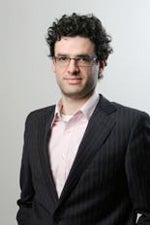Whether owners of limited liability companies should be subject to personal liability has been the subject of much controversy lately, in the U.S. and around the world. As a general rule, the personal property of members of a corporation is beyond the reach of the company’s creditors. However, the evolution of corporate law has paved way for a multitude of exceptions where the courts have “pierced the veil of incorporation.”
On Jan. 25, Bruno Salama, spoke to an HLS audience on the topic in the context of his research project and book “The End of Limited Liability in Brazil” tracing the status of corporate limited liability and veil piercing in Brazil. A professor of law at the Fundação Getulio Vargas in Sao Paulo, Salama was joined by HLS Professors Reinier Kraakman and Mark Roe ’75 at an event organized by the Harvard Law School Brazilian Studies Association.
Salama’s overarching observation was that while there is a general façade of liability limitation, the reality increasingly indicates a move towards unlimited liability. The primary focus of his book is on privately held companies, where this pattern has been the most prevalent. His analysis hinges on history within the interacting axes of Brazilian politics and economics. In this context, he discussed the relaxation of liability rules in the 1930s with the rise in power of Brazilian President Getúlio Vargas and then in the 1960s with the implementation of tax reforms.
“Today, the main focus of liability has shifted away from negligence toward debt,” he concluded. “While the former had to be proved, the latter needs only to be paid. This shift in focus was not decreed, nor can it be expressly found in the rules of corporate law or in the rules of any other branch of law.”
To describe the gradual regime shift to unlimited liability, Salama cited Marcel Proust’s description in “Swann’s Way” of certain natural processes that would be so gradual that “‘even if we are able to distinguish successfully each of the different states, we are still spared the actual sensation of change.’”
Professors Roe and Kraakman discussed similar developments in the United States, particularly with regard to labor issues.
Salama holds an LL.B. from the University of Sao Paulo and an LL.M and S.J.D. from U.C. Berkeley, Boalt Hall School of Law. Before joining legal academe, he worked in the New York office of Sullivan & Cromwell as an associate and prior to that with Pinheiro Neto Advogados in São Paulo. He has published in Brazil and internationally about topics related to Banking and Foreign Exchange Regulation, Law & Development, Law & Economics, and Intellectual Property Law.
—Shahmuddin Siddiky LL.M. ’12
